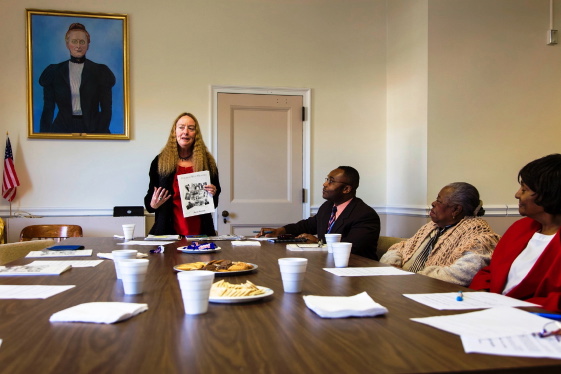 Storyteller Sharon Kennedy kicks off Haitian cultural project Storyteller Sharon Kennedy kicks off Haitian cultural project
By Nicholas Iovino
November 29, 2012
A project to capture and share the oral histories, music and art of Haitian people living in and around Medford kicked off this month at City Hall. Six Haitians attended the Nov. 5 meeting and agreed to be interviewed by Grammy Award-nominated storyteller Sharon Kennedy about their lives in Haiti and here in the U.S.
“The major goal is to honor Haitian culture,” said Kennedy, adding honor and respect are two of the most important qualities for Haitian people. The “Haitian Culture and Stories” project aims to give the larger community a glimpse into a culture rich in stories, music, proverbs and artwork. The project, made possible by a grant from Medford Health Matters, will spotlight local Haitian art, stories and other multimedia on a website, available for all to access and learn more about their Haitian neighbors. Massachusetts is home to the third largest population of Haitian immigrants, after Florida and New York, according to the American Community Survey, a study by the U.S. Census Bureau.
Dorothy Elizabeth Tucker, a non-Haitian African-American from West Medford, attended the Nov. 5 event as well. There, she introduced her daughter-in-law, Kettly Tucker, who is Haitian.Tucker previously worked with community leader Wallace Kountze on projects such as “Race, Place and Memory,” now displayed at the Medford Public Library. That project, featuring the stories of West Medford’s African-American community leaders dating back to the late 19th century, was published as a book earlier this year. Kountze also helped connect Kennedy with African Americans to interview for her 1998 project, “The Voices of West Medford,” which later became a book.
On Nov. 5, Mayor Michael J. McGlynn said he knows Haitians to be people with a strong work ethic who believe in working for their city and community. He said he was happy to see the Haitians there, embarking on this project.
When Kennedy mentioned the Haitian folktale characters “Bouki” and “Malice,” she said she saw the eyes of participants light up at the meeting. Kennedy estimated there are hundreds of variations to the “Bouki” and “Malice” tales. People from different parts of Haiti grow up hearing different tales, she said. “They’re very famous characters in Haitian folk tales, which I tell to children in this country,” said Kennedy. The Medford storyteller is extremely excited about the possibility of learning brand new Haitian folktales from her interviews with participants.
Kennedy thanked four major partners for making the project possible — Medford Health Matters for grant funding; the Medford Transcript for creating the project’s website; Elysse Castor, a Haitian native and Medford Housing Authority employee who helped brainstorm aspects of the project; and Josiane Bistoury, a Haitian who has connected Kennedy with immigrants willing to tell their stories. Both Castor and Bistoury have agreed to volunteer as translators for interviews with Haitian immigrants. Most Haitians speak Creole or French.
Kennedy is appealing to the larger community to submit any Haitian art, music or recipes to be featured in the project. She asked that anyone willing to share Haitian art, music, stories or recipes for the project, please email Sharon@sharonkennedy.com.
New folktales
Sitting in the Magoun Room at Medford Public Library, 79-year-old Haitian native Nathalie LaCroix shared stories of her life in Haiti and recalled folktales she learned as a child.
It was Kennedy’s first interview for the “Haitian Culture and Stories” project, and the storyteller said she was amazed LaCroix told her six new folktales she had never before heard.
For the Nov. 22 interview, one of Kennedy’s key partners in the project, Bistoury, translated LaCroix’s words from Creole to English. Bistoury speaks Creole, French and English.
LaCroix left Haiti 16 years ago at the age of 63. The Haitian native said she grew up in a rural area on a farm, where her family grew rice, beans, bananas and coffee. However, she later moved to Haiti’s capital city, Port-au-Prince, where she raised six children.
Kennedy asked if there were major differences between how LaCroix was brought up in the country and the way her children were raised in the city. “They had better education,” said LaCroix, through Bistoury. “All the kids went to classes. They finished high school.”
When Kennedy asked if LaCroix ever heard folk tales growing up, the Haitian mentioned the names “Bouki” and “Malice.” There are hundreds of “Bouki” and “Malice” tales, said Kennedy, which often involve Malice tricking his dim-witted brother Bouki into doing something evil or wrong. In this particular tale, Malice encourages Bouki to do something nice for his mother, give her a bath. He shows his brother how heats up the water on the fire for his mother’s bath. Without knowing better, Bouki draws a bath of scolding hot water for his mother. The water is so hot, it kills her, but Bouki does not realize this. He fetches a pipe for his mother, believing she wants to smoke. When Malice returns, he informs Bouki that he has just done a terrible thing by killing his mother.
Some of the folktales have a morbid tinge, which Kennedy said reflects some of the cruelty and oppression Haitian people have experienced for centuries along with the influence of voodoo religion on the culture. “The country has gone through so many periods of blinding poverty and violent governments that have treated the people so badly that they’ve turned to voodoo,” said Kennedy. “The cruelty that people have experienced in the culture does come out in their stories.”
Kennedy added the most authentic stories from every culture around the world often include violence and cruelty. She noted how the Grimm Brothers collected very dark tales in Germany in the 16th and 17th century. The Medford storyteller said it is well known that Hansel and Gretel’s parents purposely sent their children into the woods to get rid of them.
“People have made up those kinds of stories since the beginning of time in every culture in the world,” said Kennedy.” |

